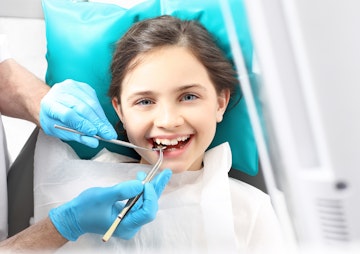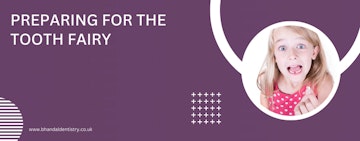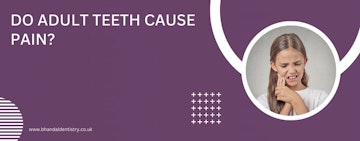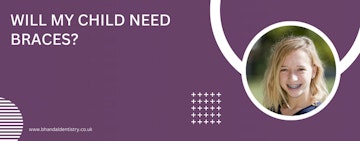What to Expect When Your Child’s Permanent Teeth Appear

The arrival of permanent teeth is a major milestone for children – and their parents – but what should you expect when your child starts to get their adult teeth?
It takes a relatively short time for children to acquire their baby teeth – and with the night-time waking and general upset this causes, that is something most parents should be grateful for.
When it comes to losing those baby teeth it is a slightly different story, with teeth taking years to come through. In this guide, we’ll explore what to expect as your children get older and start to lose their baby teeth. We’ll also share our advice for helping them to take care of their new adult teeth.

Losing baby teeth
Most children start to lose their baby teeth from the ages of four to six. As a general rule, these are lost in the same order that they arrived – usually the bottom two front teeth (incisors) are the first to go.
From here the top two front teeth usually work their way out. As well as replacing baby teeth, children will also grow permanent teeth that have not had a predecessor. The first of these to appear are the ‘six-year molars’, which usually appear after the loss of the bottom two front teeth.
From here, the teeth continue to develop with most children expected to have 28 permanent teeth by the age of 13, with wisdom teeth expected between the ages of 17 and 21 years old. Some people never get their wisdom teeth, because they don’t emerge, or they might emerge partially and cause issues.
Among these permanent teeth will be another set of new molars, known as the ’12-year molars’.

The arrival of the adult teeth
While it is important to take care of baby teeth to ensure good wellbeing and to avoid unnecessary pain and dental treatment, there are no second chances with adult teeth and it is imperative that children develop and maintain good dental hygiene habits.
One of the best things you can do for your child as a parent is to help them to develop good oral hygiene habits. These habits will last a lifetime and help them to take care of their permanent teeth.
In particular, when new molars arrive, make sure that your child becomes used to brushing further back in their mouth. This will allow them to properly brush the new tooth, which of course is in an area they would not be used to brushing.

Preparing for the tooth fairy
It’s common for children to save their teeth and place them under their pillow at night. Parents then exchange these teeth for money. How much you decide to give is a personal choice, but it’s worth checking with your child’s friends to ensure it isn’t too much/not enough.
Most parents will give a larger sum for the first tooth, usually around £5. Subsequent teeth can then fetch around £1 to £2 each. Parents can buy elaborate pouches for the tooth, or create a small paper envelope to keep the tooth safe.
If your child loses their tooth, they might be concerned that they won’t be able to exchange this for money with the tooth fairy. In this case, you can simply tell them that the tooth fairy will retrieve the tooth for them and then leave money under their pillow anyway.

Do adult teeth cause pain?
Thankfully the pain associated with the arrival of baby teeth is not usually seen with the emergence of permanent teeth, however, teeth erupting can still cause discomfort.
Molars in particular can cause headaches in some patients. Treat general pain with paracetamol but should you have any concerns, or if the pain is prolonged or serious, then get in touch with your dentist.
If the teeth are impacted, this can lead to painful infections. There is also a chance that the baby teeth could be retained due to fusing with the bone. In this case, the teeth behind might struggle to emerge. This is something that your dentist can assist with.
Teeth that appear to be growing behind baby teeth should find their way out naturally. These will eventually drop out, leaving the permanent tooth that has grown behind. However, if there are any issues, it’s important to visit the dentist to make sure this process happens as expected.

Will my child need braces?
Parents may also be concerned about how straight their child’s permanent teeth appear to be growing. While many new teeth may appear to be growing at an angle these do generally settle down and straighten out as the remaining teeth come through.
Your dentist will be monitoring the emerging teeth for alignment issues and they will recommend orthodontics if this is required. While parents can explore this option privately, only you dentist can refer your child for NHS orthodontics based on clinical requirement.
Closing thoughts
Teething is a difficult topic for parents, but thankfully the arrival of adult teeth doesn’t have to result in the same drama and difficulties. Adult teeth typically arrive without issue, with misalignment being the main concern for parents. Provided your child is attending regular checkups, all potential issues should be caught by your dentist before they become more problematic.
Should you have any concerns about your child’s teeth please contact Bhandal Dental Surgery.
Call us now to make an appointment

Keep reading...
How A Smile Makeover Can Increase Your Confidence
When patients want to achieve a dramatic transformation, we often recommend a smile makeover. This bespoke treatment plan can mean…
What is SmileFast?
SmileFast is a new dental treatment plan that allows you to achieve a dramatic smile transformation in as little time…
Anti-wrinkle injections - All you need FAQ's
The most common cosmetic treatment in the world now is anti-wrinkle injections. It's a simple and effective technique that involves…
What are Veneers?
Veneers are thin coats fitting over the teeth, protecting them from damage and creating a lovely smile. The tooth-coloured shells…

Hear from our
happy patients
These are just some of the kind words about our practice, direct from our incredible patients.









